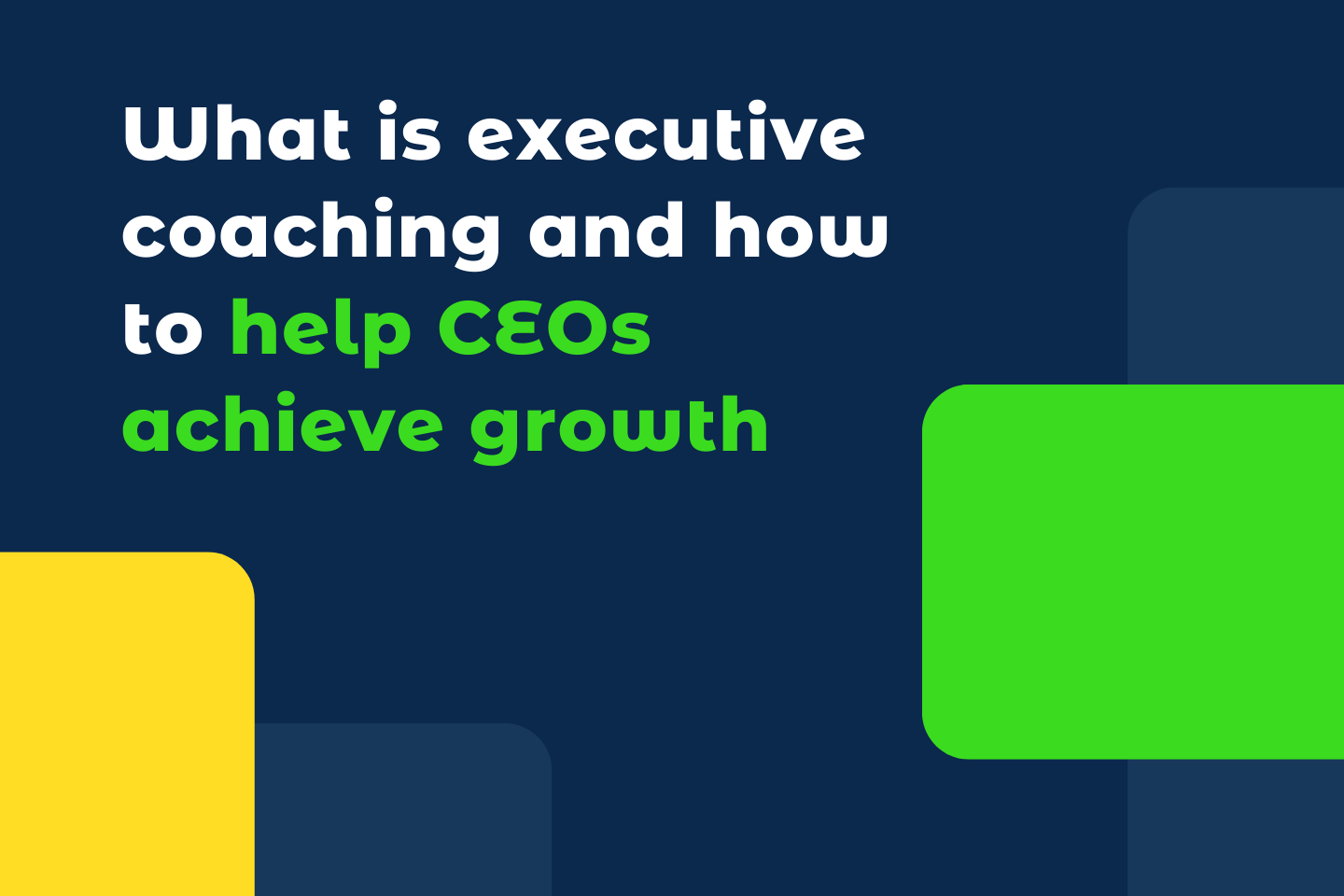In today’s fast-paced and ever-changing business world, CEOs are constantly faced with complex challenges and difficult decisions. To navigate these challenges and achieve growth, many of them turn to executive coaching. According to statistics, 39% of CEOs already work with a coach.
Executive coaching, in a nutshell, is one-on-one coaching aimed at helping leaders develop their skills and enhance their performance. Through it, CEOs can gain valuable insights, receive feedback, and work on specific areas of development. The benefits are numerous, including improved communication, increased self-awareness, and better decision-making.
In this blog post, we will explore what this type of coaching entails and offer tips on how to best use it to your advantage.
What is Executive Coaching?
Executive coaching intends to teach and guide executive leaders in managing people and organizations better. The coaching process typically involves a series of structured sessions focused on improving organizational performance. During these sessions, the coach and coachee work together to identify areas for improvement and develop strategies for addressing them.
The role of an executive coach is to facilitate the coachee’s growth and professional development by providing guidance, feedback, and one-on-one support. They help the coachee to gain self-awareness, clarify their goals, and develop strategies for achieving them. Additionally, they provide accountability and encouragement to help the coachee stay on track.
The coachee, on the other hand, is responsible for actively engaging in the coaching process, being open to feedback, and being willing to take action to improve their performance. They are also responsible for setting goals and objectives and working collaboratively with the coach to develop strategies for achieving them.
Executive Coaching vs. Leadership Coaching vs. Business Coaching
Business coaching includes a broad range of topics like manager, executive, team, and organizational coaching. A business coach may guide their client in improving their mindset, developing business strategy, or simply enhance the efficacy of leaders.
Executive coaching is a subset of business coaching. Its emphasis is on personal growth, with executive coaches aiming to help their clients in developing self-awareness and clarifying their beliefs so that they can set and accomplish their objectives. They also serve as an external sounding board for CEOs and senior leaders to realize their full potential.
Leadership coaching is sometimes referred to as an executive coaching subgroup. Its goal is to help clients understand how to become more inspiring, influential leaders with strong communication skills. The client learns how to strengthen teamwork and communication with personnel during the leadership coaching process.
Why Do CEOs Need Executive Coaching?
As a CEO, you face a unique set of challenges and opportunities in your leadership roles. You are responsible for setting the strategic direction of your organization, managing complex relationships with key stakeholders, and leading teams of employees to achieve their goals. In addition, you are likely facing pressure to perform and deliver results in a constantly changing and competitive business environment.
Executive coaching programs can help you improve your performance in a variety of areas. For example, it can help you enhance your leadership skills, increase your emotional intelligence, expose blind spots, and develop effective communication and relationship-building abilities. It can also help you manage stress and maintain a healthy work-life balance.
Working with a CEO coach can offer fresh viewpoints and insights that can help you think creatively and comprehensively about a certain topic, which could lead to developing more sensible choices and making long-lasting adjustments.
One of the key benefits of executive coaching is that it provides a safe and confidential space for you to reflect on your strengths and weaknesses and identify areas for improvement. It is also beneficial for developing a growth mindset and a commitment to continuous learning and development, which is essential in today’s fast-paced business environment.Executive coaching services can also help you navigate specific challenges and opportunities that may arise. For example, it can assist you when managing transitions, such as taking on a new role or leading a merger or acquisition. It can also help you develop your vision and strategy, build effective executive teams, and manage conflicts and crises.
How to Find and Choose an Executive Coach?
Choosing a suitable executive coaching provider is a critical decision as it can impact your professional growth and business success. Here are some tips and criteria to consider when choosing an executive coach:
- Coaching credentials and experience. Look for certified coaches with proven coaching skills and experience in CEO coaching. A good executive coach should have a track record of success in working with CEOs and leaders in similar industries.
- Confidentiality. You have a wide range of important duties as an executive, including making presentations to investors and interacting with stakeholders. Your reputation and image could be damaged if the senior leadership coach you work with shares material from your meetings with HR or other team members. Make sure all information supplied is private and discreet when seeking an executive coaching partner.
- Chemistry and rapport. A trusting and collaborative relationship is essential for a successful coaching experience. To find the perfect candidate for executive coaching, look for someone who you feel comfortable with and can build a good rapport with.
- Coaching style. Every executive coach has a unique coaching style. Some are more directive while others are more facilitative. Choose an executive coach whose coaching style aligns with your needs and preferences.
- Process and tools. Ask about the coach’s process and tools for coaching. A good executive coach should have a structured process and use tools that are relevant to your needs and goals.
- Additional services. Some coaches specialize in practicing across a range of specialties like career coaching and performance coaching.
- References and testimonials. Ask for references and testimonials from previous clients. This will give you an idea of the coach’s track record and continued success rate.
There is a wide variety of sources and platforms where you can find qualified and experienced executive coaches, such as professional associations, online directories, and referrals from colleagues or industry leaders.
To establish a trusting and collaborative relationship with an executive coach, it’s essential to be open and honest about your goals and the biggest challenges. Be willing to receive honest feedback and be open to new perspectives. It’s also important to establish clear expectations and boundaries for the coaching relationship, including goals, timelines, and confidentiality. By working collaboratively with your coach, you can achieve your goals and enhance your leadership capabilities.
Understanding the Executive Coaching Process
An effective executive coach should possess a range of key skills and leadership competencies, including strong communication and listening skills, the ability to build trust and rapport, and a deep understanding of team dynamics and leadership. They should also be skilled at asking powerful questions, providing constructive feedback, identifying professional development opportunities, and facilitating meaningful conversations that help the client gain insights and develop new perspectives.
A coaching program’s execution may take six months or longer if needed. The coach will initially make an effort to get to know you. They’ll investigate your employment history, motivations, and working conditions. The goal of the initial phase is to develop mutual trust and intimacy.
Then, the coach will use assessment tools and interviews with relevant stakeholders, peers, and direct reports to create custom development plans that will help you become more self-aware, set goals, and get honest feedback from the right people about you. Then, they will create a unique growth plan for you based on the results of these participant assessments and interviews.
Here’s a summary of the key steps included in corporate coaching.
1. Create a connection
The goal of your first session is to get to know you a little better. Your instructor will do the following:
- Analyze your chemistry. Do you two get along? Will rapport and trust be easy to build?
- Ask you to describe your goals. What do you hope to accomplish through coaching?
- Create confidentiality agreements. Because your approval is essential, your coach will take the time to go over the specifics with you.
- Ask you about your current job and personal life. This will allow them to be more able to understand your viewpoint, and you can then determine how to continue.
2. Coaching sessions
You’ll likely hold sessions every two to three weeks, for a total of six to twelve sessions on average. For each meeting, the coach will do the following:
- Check in to see how you’re doing.
- Review any assignments you received from your coach.
- Set objectives for the present session.
- Get guidance and coaching.
3. In-between sessions
When you’re not working with your coach, you need to be applying what you’ve learned. Make certain to:
- Discover new methods of operation.
- Keep an eye on the progress outcomes.
- Identify personal challenges.
- Keep your eyes on your objectives.
4. The last session
Your coach will meet with you at the conclusion of the executive coaching engagement to assess your progress toward achieving your set goals.
- Estimate your progress
- Recognize your accomplishments.
- Make a strategy for your life after coaching for maintaining the new behaviors, ideas, and skills for long-term success.
How to Make the Most of Executive Coaching Sessions?
Making the most of your sessions requires active participation and a commitment to growth and leadership development initiatives. In addition to finding the perfect candidate, here are some best practices and strategies for preparing and participating in the sessions:
- Prepare in advance. Before each session, take some time to reflect on your progress, challenges, and goals. Review any homework or action items from the previous session and prepare a list of questions or topics to discuss with your coach.
- Be present and engaged. During the session, focus on being present and engaged. Eliminate any distractions and give your full attention to the conversation. Be open and honest with your coach and share your thoughts, feelings, and perspectives.
- Set SMART goals. Work with your coach to set SMART goals that align with your overall objectives and vision. Break down each goal into actionable steps and create a timeline for achieving them.
- Take action. After each session, take action on the insights and feedback you received. Implement the action plan and experiment with new behaviors and strategies. Keep track of your progress and results.
- Evaluate and adjust. Regularly evaluate your progress and adjust your goals and action plans as needed. Use tools and resources such as feedback surveys, self-assessments, and business performance metrics to track and measure your progress.
- Use the right tools. Some tools and resources that can help you make the most of your executive coaching sessions include books, articles, podcasts, and online courses on how to become an accomplished business leader, enhance communication, and other relevant topics. You can also use apps and software such as goal-tracking tools, habit trackers, and mindfulness apps to support your growth and personal development.
The Bottom Line
Executive coaching is a powerful tool that can help CEOs and business leaders achieve their full potential, enhance their performance and well-being, and drive organizational success. By working with a qualified and experienced executive coach, CEOs can gain new insights, perspectives, and strategies, improve their leadership capabilities, and achieve their goals.
To make the most out of it, it’s essential to be open-minded, committed, and willing to learn and grow. With the right mindset and approach, this can be a transformative experience that can help CEOs and their organizations thrive in today’s fast-paced and competitive business environment.

